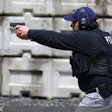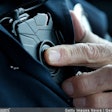If you've read my column before, you know from time to time I've mentioned "but, what, if then" training scenarios. A training partner of mine from yesteryear, Vance McLaughlin, was known to scream at his students "what to do, what to do, what to do" while they were being overloaded in physical training.
These statements promote active decision-making under stress. Trying to make decisions and never having practiced the skill before is the express lane to disaster. When you're stressed to the limits, you'll perform at the lowest level of training you've mastered. If you haven't trained, you'll fail.
I always like to listen to locker-room or roll-call banter. It usually sounds similar to this, "and if this happens, I will do this and that and then finish it off with a spinning back kick." Really now?
I refer to this as selling wolf tickets; recall the tale of the little lad who cried wolf. Here you're selling the storyline of you crying out with your exploits. Have you heard a similar rookie story? Luckily, a salty old trainer got to him before he attempted his nearly impossible physical feats.
The youngster always read the latest periodicals, talked a good game and walked around like Little Tommy Tactical. He had a pat answer to nearly all physical and tactical responses to street scenarios, including zombie attacks.
There was one problem here; he was no physical specimen and not really in great shape. The trainer asked him has he been working out and how frequently. Little Tommy Tactical responded that he reads, visualizes and commits it to memory; he does not need to train.
This was so far off-base, I still had difficulty in attempting to understand this theory of "memory arts." The trainer then convinced the youngster to demonstrate on him a particular move, which was a miserable failure. Then another, which was far worse. The training point was made here without too much discussion. You have to train far more than the brain.
Holster manufactures provide all of the disclaimers about practicing by drawing the weapon from a new holster a multiplicity of times before street use. It's called muscle memory and what I call rebooting the brain. Drawing a weapon from a holster requires this much practice, so what about twists, turns, counters, balance displacement, target acquisition and whatever else that comes into play.
Do you recall how awkward your first attempts of performance exercises were in the academy? You were doing some activities that were unnatural to you. With proper instruction and practice, you managed these skills and graduated. Why do you think that we have recertification of defensive tactics, firearms and other skills? It is similar to other acquired skills, if you don't use it, you'll lose it. When was the last time you trained without being mandated by orders to attend?
It all comes down to you. Don't let the state recommended guidelines or your department's training unit decide how or what you need to practice. These are probably minimum guidelines at best.
You should know your anaerobic and aerobic capacities, your skills and your job demands. You must invest your personal time to ensure your success and survival. See you in the gym.

















